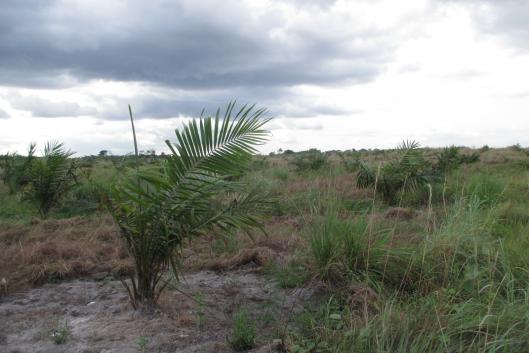Oil palm has traditionally been part of the culture of West and Central African communities, who have planted it on their own lands or collected its fruits, leaves or sap from the forest. The native crop has been locally processed to obtain palm oil for domestic use or sold in the local markets to produce palm wine (see the WRM briefing “Oil palm in Africa: Past, present and future scenarios”,http://wrm.org.uy/countries/Africa/Oil_Palm_in_Africa.html).
But the international demand for palm oil – and more recently agrofuels – has brought land-hungry capital to Africa seeking to plant vast areas of land with large-scale industrial oil palm plantations. African governments are opening the doors to the corporations, and a result, local communities are losing their rights over their territories.
In Gabon, the organization Brainforest has sounded the alert that the new Gabonese authorities are granting large areas of land under concession to the Singapore-based company Olam. Ancestral lands are being sold off in violation of peoples’ rights in order to plant vast areas of monoculture oil palm plantations, one of the business lines of this global integrated supply-chain agribusiness corporation which trades 20 agricultural products and food ingredients.
Brainforest has launched a campaign to collect signatures to stop Olam’s industrial oil palm plantations, at http://www.brainforestgabon.org/news_fiche.php?id=16#.UAbg4aDs3KT
Another Gabonese organization, Attac Gabon, issued a press release (1) on June 5 denouncing that the failure of international negotiations on climate change and the commodification of the climate crisis through false solutions like the concept of a “green economy” will eventually destroy the socio-cultural fabric of communities and undermine national sovereignties.
According to the press release, “In Gabon, the phenomenon takes on dizzying proportions when you consider that over 300,000 hectares of land are already being turned over to multinationals. A general mobilization is needed to enforce the rights of communities over their land.”
Meanwhile, FERN (2) has reported that on June 8, some 40 civil society activists including Marc Ona Essangui, director of Brainforest and winner of the Goldman Prize (a sort of “Green Nobel Prize”), were arrested in Gabon for organizing a demonstration they called the “Counter-Forum”. The demonstration – forbidden by the Gabonese authorities – aimed to highlight the pervasive corruption and lack of democracy and accountability in the oil-rich Central African country during the New York Forum Africa, held in Gabon June 8-10. At issue are land tenure problems, the expulsion of local communities in the province of Woleu Ntem, and land grabs by palm oil companies.
Under international pressure, the government offered to release Ona the same day, but he refused to leave until they released all who had been arrested. All of the arrested protestors were later released.
(1) Notre terre, leur Business!, Attac Gabon, Press release, 5 June 2012,http://www.facebook.com/notes/attac-gabon/notre-terre-leur-business-communiqu
%C3%A9-de-presse-dattac-gabon/10150840486325069
(2) EU Forest Watch Issue 172, June 2012, FERN,http://www.fern.org/sites/fern.org/files/FW%20172%20june%
202012%20for%20website.pdf
